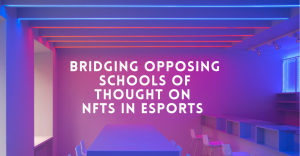Last month, news broke that Steam has banned games that use blockchain or games that enable the exchange of trading of NFTs on its platform.
A newly-added rule on Steam’s onboarding guidelines says users are not allowed to publish ‘applications built on blockchain technology that issue or allow exchange of cryptocurrencies or NFTs’.

RELATED: K1CK Esports announces first NFTs
Conversely, Epic Games, another top gaming platform seems to be embracing blockchain, and in a statement to The Verge revealed that it is ‘open to games that support cryptocurrency or blockchain-based assets’.
While Steam is yet to comment publicly on the matter and Epic is still working on how it will exactly support NFTs on its platform, there have been some in-depth debates for and against the role of blockchain, crypto, and NFTs in the future of gaming and esports.
A background on NFTs
NFTs, or non-fungible tokens, refer to unique blockchain-powered digital tokens used to record and track the ownership of digital assets such as images, videos, text, and audio.
NFTs have become increasingly popular in the last several months with different headline-grabbing news such as Twitter’s Jack Dorsey selling his first tweet as an NFT for $2.9m (~£2.13m) and the digital artist Beeple selling a collection of digital art as an NFT for $69m (~£50.7m).
In the esports and gaming industry, NFTs are being positioned as a way to prove the authenticity and ownership of in-game assets, skins, trophies, highlights, tournaments. Also, NFTs could enable the purchase, sale, and transfer of these items outside the virtual world of games and beyond the gaming industry.
The case for NFTs in gaming and esports

RELATED: How NFTs can add value to fans
NFTs could introduce greater fan engagement opportunities in esports which could benefit gamers, teams, tournament organisers, audiences, publishers, and other stakeholders. For instance, NFTs could help substantiate in-game assets, purchases, and achievements; thereby extending values beyond virtual gaming worlds. Last year, 63 per cent of gamers say that they would spend more on virtual goods if they had real-world value, and could be traded or sold.
Similarly, NFTs could help create formal structures around the grey market of gaming assets and memorabilia to validate the proof of authenticity and ownership of such assets. NFTs could also open up new revenue streams for gaming and esports companies by enabling them to track re-selling and receive perpetual licensing from intellectual properties. Likewise, NFTs could help the commodification of gaming content for distribution into new markets.
The case against NFTs in gaming and esports
The cryptocurrency industry has faced challenges and is largely considered high-risk for many corporations. NFTs are a subset of cryptocurrencies and are still very novel, mostly misunderstood, and the hype around pricing causes the media to fixate on its speculative nature. Hence, it is not surprising that some legal and executive teams would recommend that esports organisations avoid cryptocurrencies and NFTs altogether.
There is a rational fear that merging NFTs with esports and gaming could expose the gaming community to scams, frauds, and hacks. Last month, a developer promoting a fighting game called ‘Evil Ape’ in which there was supposedly a collection of ‘10,000 unique NFTs trapped inside a lawless land’ turned out to be a scam after disappearing with more than $2.7m (~£1.98m) investors funds.
How Verasity is bridging the divide between the world of esports and NFTs

RELATED: BLAST Premier and Bondly launch chicken NFTs
Verasity is a protocol and product layer platform powering decentralised solutions for the esports and video entertainment industries. Verasity is looking to offer a platform that will improve the esports experience with blockchain-based solutions, without forcing the overhaul of existing legacy infrastructures on which the esports industry runs.
For instance, in addressing the concerns about frauds and scams, Verasity has developed a blockchain-powered solution for fraud management that helps validate the authenticity of digital assets by recording data on an immutable decentralised ledger.
Similarly, Verasity’s solution could also authenticate the seller or marketplace on which in-game NFTs are listed. This ensures that the seller has the legal right to sell such assets, the assets are authentic and accurate to its description, and guarantee that buyers are purchasing such assets from legitimate and authorised marketplaces.
Fraud is holding back NFTs from mass adoption. The technology is powerful, but it requires advanced verification systems to unlock its potential universally. The esports market is one of the early adopters of NFT technology and Verasity has been developed to help ensure its safe growth.
To conclude, Justin Wenczka, CRO at Verasity, commented: “One of Verasity’s missions is to significantly increase engagement, revenue, and opportunities for all stakeholders in the esports value chain.
“We think that NFTs present an opportunity for esports to attract a new audience, and we will continue to empower the esports industry with the tools and technologies needed to leverage emerging decentralised technologies for sustainable growth.”
[primis_video widget=”5183″]
ESI Podcasts | Digest, Focus, Insight
From our advertiser Verasity

